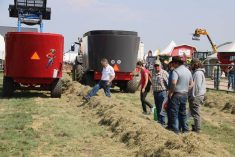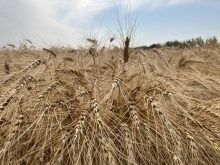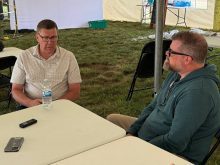Prairie farmers who voted in the Canadian Wheat Board’s director elections have sent a message.
Given a choice between candidates who wanted to keep the single desk and candidates who wanted to bring in an open market, a majority of voters chose single deskers.
In an election held against a backdrop of a federal government intent on ending the single desk, and the most organized campaign effort yet by open market supporters in Western Canada, single desk candidates won four of the five director seats up for grabs.
Read Also
Man charged after assault at grain elevator
RCMP have charged a 51-year-old Weyburn man after an altercation at the Pioneer elevator at Corinne, Sask. July 22.
That’s the same result as the last election in the five even-numbered CWB electoral districts in 2004.
As a result, the balance of power around the marketing agency’s board table will remain unchanged.
Single desk supporters continue to hold a majority, with eight elected directors.
Six directors are open market supporters, including two elected and four government-appointees.
Chief executive officer Ian White, who remains publicly committed to neither side in the marketing debate, is the 15th member of the board.
Here are some of the numbers from the election:
- 16,497 ballots were returned to election co-ordinator Meyers Norris Penny for a response rate of 52.8 percent, the highest ever for a CWB election. (113 ballots were rejected).
- The eight candidates who ran on a campaign to retain the single desk garnered 9,267 votes, or 56.6 percent of the votes counted on the first ballot.
- The 10 candidates who supported an open market, or marketing choice, received 7,007 votes, representing 42.8 percent of votes cast.
(One candidate ran on an uncommitted platform and received 110 votes.)
- In the 2006 election in odd-numbered districts, single desk supporters won 63 percent of the vote and open marketers 37 percent.
- The 10 elected directors support the single desk by a margin of 8 to 2.
For farmers and farm groups who have been fighting to retain the single desk, the results were welcome news.
Larry Bohdanovich, a farmer from Grandview, Man., and a member of Real Voice for Choice, said the results were unequivocally in support of the single desk.
“In spite of the federal government’s continuous abuse of power in its quest to dismantle the marketing monopoly, farmers have clearly shown their support for a strong, farmer-controlled CWB,” he said.
National Farmers Union president Stewart Wells called it a “huge victory” for farmers.
“Farmers have spoken and if the prime minister believes in the will of the majority, he must now stop attacking the CWB,” he said.
While winning only one of the five races, supporters of the open market found a silver lining in the fact that the number of first-ballot votes for open market candidates increased for the third consecutive election, to 42.6 percent, from 37 percent in 2006 and 35 percent in 2004.
“We would like to have seen that translate into more seats, but a sizable minority said they’re not happy and they want marketing choice,” said Western Canadian Wheat Growers Association president Cherilyn Jolly-Nagel.
She added that regardless of the election results, the association will continue to argue that the decision on how to market grain should be left up to individual producers.
Richard Phillips, executive director of Grain Growers Canada, which supports an end to the single desk, said the message for pro-choice advocates is to work harder to explain to growers how marketing choice would work and how the CWB would operate in such a system.
Wayne Easter, Liberal agriculture critic, said farmers showed courage in standing up against a government that was willing to do anything to help open candidates win the election.
“Clearly this is a repudiation of the prime minister’ attempts to undermine the wheat board,” he said.
Farmers have sent a strong message to Ottawa, Easter said, but added he doubts whether the current government will pay any attention to it.
“The bottom line is that farmers themselves should make the decision as to the board’s future without any interference from government,” he said.
Federal agriculture and CWB minister Gerry Ritz could not be reached for comment by press time.
















